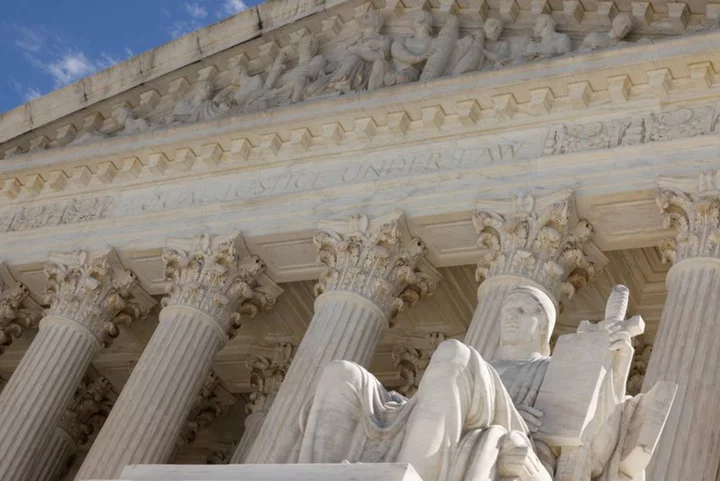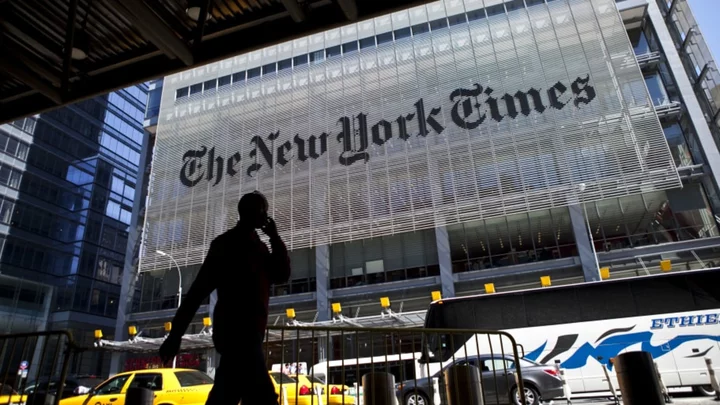By John Kruzel
WASHINGTON The U.S. Consumer Financial Protection Bureau is currently pursuing nearly two dozen lawsuits accusing prominent defendants including Fifth Third Bank, TransUnion and Moneygram of financial misconduct. But the watchdog's future may be in peril thanks to a case now before the U.S. Supreme Court.
The agency's 300-plus enforcement actions from 2012-22 have delivered $16 billion of relief to American consumers, drawn in part from a $3.7 billion settlement last year with Wells Fargo, according to CFPB data.
Yet as it continues to police financial wrongdoing, the CFPB faces an existential threat in the case pursued by two trade groups representing the payday loan industry to be argued before the justices on Oct. 3 - the second day of the Supreme Court's new term - that could grind the agency's operations to a halt.
A ruling is expected by the end of June. The court's 6-3 conservative majority has limited the regulatory power of federal agencies in a series of rulings in recent years.
Established to curb predatory lending following the 2008 global financial crisis, the CFPB under an arrangement designed by congressional Democrats draws money annually from the U.S. Federal Reserve rather than budgets passed by Congress. The justices will weigh a challenge to this funding structure that could starve the agency's coffers and place its existing rules on shaky legal ground.
President Joe Biden's administration is appealing a lower court's ruling that embraced arguments made by the challengers that the CFPB's "perpetual budget" violated the U.S. Constitution's "appropriations clause," which vests spending authority in Congress.
The agency's supporters have said unraveling protections safeguarded by the CFPB would leave consumers vulnerable to deceptive and abusive practices by lenders and debt collectors.
"The harm would be profound," said Ellen Harnick of the Center for Responsible Lending, a consumer advocacy group. "The market disruption, if existing rules are called into question, would be hard to overstate. ... All of the problems that led to the creation of the CFPB would now be unattended to."
Pro-business conservatives and their Republican allies believe the court fight has brought them closer than ever to dismantling the CFPB. Such an outcome long has been sought by conservatives who criticize what they call the "administrative state," the federal bureaucracy spanning various agencies that interpret laws, craft rules and implement executive action affecting millions of Americans each day.
'TOUGHEST FINANCIAL PROTECTIONS'
Democratic President Barack Obama, who signed the 2010 legislation creating the CFPB, hailed it at the time as a watchdog "charged with enforcing the toughest financial protections in history." Congress, then controlled by Democrats, authorized the agency to supervise certain financial institutions' compliance with federal consumer laws, backed by the threat of lawsuits and fines.
Many Republicans have opposed the agency from the start, saying it wields too much power and burdens banks and other lenders with unnecessary red tape.
One of its fiercest critics is Mick Mulvaney, who as a Republican congressman opposed the agency and later served as its acting director under Republican President Donald Trump. The agency's first quarterly funding request under Mulvaney was for exactly zero dollars. It also temporarily froze hiring and halted new enforcement actions while shifting focus to include "regularly identifying and addressing outdated, unnecessary or unduly burdensome regulations," according to a 2018 CFPB mission statement.
Mulvaney is among the conservatives urging the Supreme Court to dismantle the CFPB, which he described in a court brief as "one of the most opaque, least transparent and potentially most abusive agencies in the federal government." More than 130 Republican U.S. lawmakers and 27 states, most led by Republicans, backed the challengers in court briefs.
The case stems from a 2018 lawsuit by the Community Financial Services Association of America and the Consumer Service Alliance of Texas, representing the payday loan industry.
Their lawsuit took aim at a 2017 CFPB regulation designed to curb "unfair" and "abusive" practices by certain high-interest lenders. It stops lenders from trying to charge a borrower's bank account after two unsuccessful attempts in a row.
A federal judge in 2021 sided with the CFPB. But the New Orleans-based 5th U.S. Circuit Court of Appeals last October ruled that the agency's funding structure violated the Constitution. The decision, by a panel of three Trump-appointed judges, also invalidated the regulation at issue.
Biden's administration told the Supreme Court that the CFPB's funding structure approved by Congress - with a fixed amount going to the agency annually - was effectively "a standing, capped lump-sum appropriation." The Fed last fiscal year transferred around $642 million to the agency.
The CFPB's supporters said in court briefs that invalidating its funding mechanism could endanger similarly structured agencies including the Federal Deposit Insurance Corporation, Office of the Comptroller of the Currency and even the Federal Reserve itself.
(Reporting by John Kruzel with additional reporting by Douglas Gillison; Editing by Will Dunham and Scott Malone)









